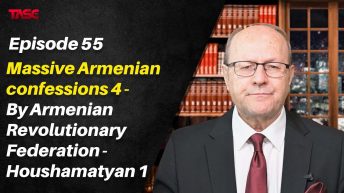Admiral Bristol served as the Commander of the U.S. Naval Detachment in Turkish waters and as the U.S. High Commissioner to Turkey in the years 1919-1927. He witnessed firsthand the Turkish War of Independence, the formation of the First Turkish Republic, and the early years of its existence.
His papers, consisting of some 33,000 items, include reports, diaries, correspondence, copies of official dispatches, telegrams, and appointment sheets, covering his entire career. Bristol’s intellectual correspondence supported by formidable documents he gathered, is often cited during discussions of numerous events of the time. He is known to be objective, accurate, and honest, like an honorable soldier should be. So why do the Armenians hate him? And why do the Armenian-financed so-called genocide scholars deliberately ignore his writings? Could it be because Bristol played a significant role in opposition to Armenian fantasies of establishing an apartheid on Turkish soil under the cover of an American mandate?
To answer these question, it suffices to examine the Turkish occupation of the city of Kars on October 30, 1920 and the subsequent fate of its Armenian residents. Typical of the works include Christopher J. Walker’s Armenia: The Survival of a Nation and Dickran Boyajian’s Armenia: The Case for a Forgotten Genocide. Walker quotes at length from Armenian sources like Simon Vratsian (former PM of Armenia), Minister A. Bablian (an eyewitness), and a report taken from the Baku Armenian newspaper, Komunist.
All three sources describe massacres perpetrated by the Turkish soldiers. Vratsian writes: “For three days uninterruptedly the Turks looted, raped and killed, and perpetrated every kind of savagery in the city.” Bablian, in the words of Walker, “describes with terrifying colors the cruelties done by the Turks.” Komunist newspaper says this: “…But the troops which entered the city spared neither women, children nor the aged. For five days these bloodthirsty soldiers and the Kurds perpetrated upon the head of the peaceful population atrocities which were beyond the imagination of man… In Kars alone 6,000 Armenians fell victim to Turkish brutality.” The reader is left with the impression that the Turkish occupation of Kars was accompanied by widespread looting by the Turkish soldiers and the massacre of between 6000 + Armenian residents of the city. Both Walker and Boyajian fail to utilize any non-Armenian accounts of the fall of Kars and its aftermath.
The reader whose knowledge is limited to these two works would be unaware that there were some twenty American Near East Relief workers resident in Kars on October 30, 1920, or that the commanding General of the Turkish Nationalist forces who conquered the city, Kazim Karabekir, has left a detailed account of the city’s occupation in his autobiography. Karabekir provides the following passage relating to the aftermath of its occupation: “By late evening [October 30, 1920] the following prisoners had been brought to my headquarters in the Station: 3 generals, 6 colonels, 12 majors, 16 captains, 59 lieutenants, 16 civilian officials, 12 officers and 4 cadets. There were also 1,150 soldiers taken prisoner.
The number of confirmed Armenian dead was 1,110. Among the captured supplies were: 337 usable cannons, 339 cannons which needed repair, many machine guns, all kinds of bullets, ammunitions, etc. Among the prisoners were: Aratof, the Minister of War; Velilov, the Chief of the General Staff; Primof, the Commander of the Kars Fortress, and a civilian officer. This victory which I gained by a counter-offensive was a great success; and even though we destroyed a large part of the enemy army and conquered a modern fortress, we suffered few casualties: 9 dead and 47 wounded. In my order to attack Kars, I had stated the following: ‘The goal of this offensive is to destroy the principal Armenian forces within Kars or to drive them out of Kars.’
As a matter of fact my soldiers proved that they were a disciplined, powerful, modern army, and that they possessed remarkable humane feelings. Even though they had successfully attacked a modern fortress such as Kars, they did not commit the slightest harm against the city’s civilian Armenian population.” This fact was witnessed by the American delegation resident there, Edward Fox, District Commander N.E.R. Kars, and in a telegram they dispatched to Admiral Bristol on October the 31st, they wrote: “All the Americans in Kars are well, and the Turkish Army is full of concern for us and accords us all considerations. We have been given permission to continue our activities as before. The Turkish soldiers are well disciplined and there have been no massacres.”




Add comment